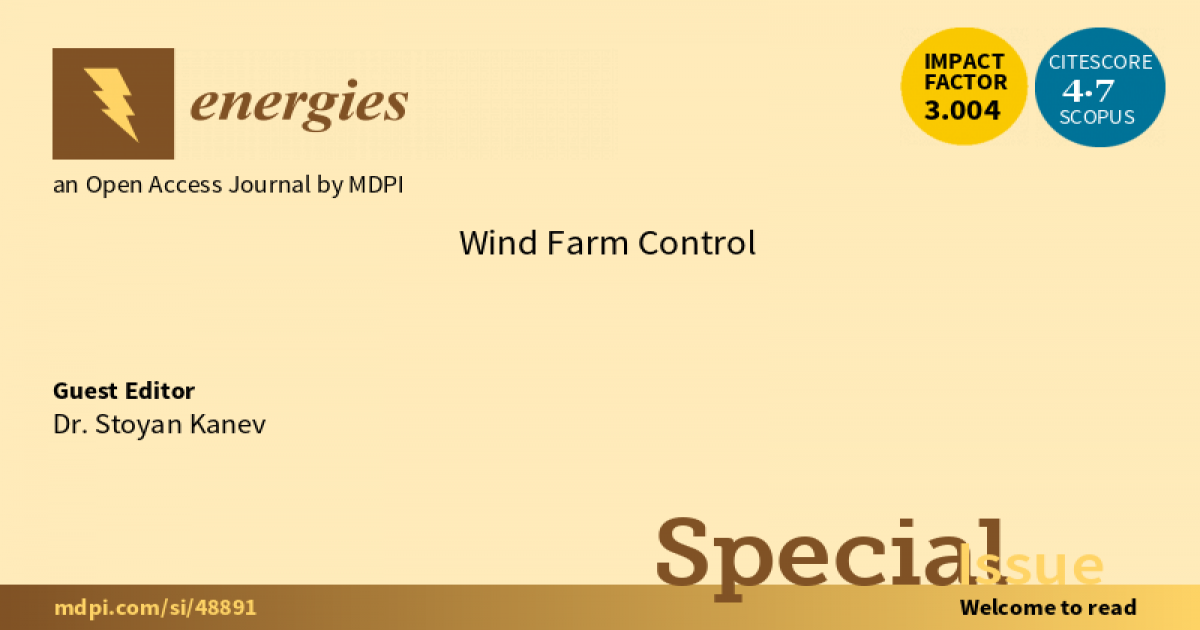- 3.2Impact Factor
- 7.3CiteScore
- 17 daysTime to First Decision
Wind Farm Control
This special issue belongs to the section “A3: Wind, Wave and Tidal Energy“.
Special Issue Information
Dear Colleagues,
I am very happy to invite you to submit papers to a Special Issue of the journal Energies on “Wind Farm Control”.
The topic of wind farm control (WFC) relates to a wide range of methods and strategies to operate the wind turbines within a wind farm in a coordinated way to achieve a common target. WFC targets (and therefore topics for this Special Issue) could include:
- Reducing wake losses in order to increase the power production of the wind farm;
- Mitigating structural loads on the turbines’ components in order to reduce maintenance costs or increase lifetime;
- Ensuring that the active and reactive energy production comply with the infrastructural and contractual limitations;
- Matching the energy demand at minimum cost; or
- Supporting the grid stability by means of active and reactive power control.
While in the short term the focus lies on dealing with the practical implications related to the implementation of active wake control to boost the power production of wind farms (dynamic control, robustness to model and measurement uncertainty, turbine availability), in the long term WFC challenges relate to the implementation of a high share of wind into the energy system. Wind farms will need to be flexible enough to provide active and reactive power control to secure revenues in volatile markets and support grid operation. Furthermore, the integration of wind with other renewable sources, energy conversion systems, and energy storage systems will be needed in order to meet the demand variations and to comply with electricity transport limitations. Therefore, contributions proposing innovative controllers for hybrid renewable energy systems including energy generation, storage, and conversion are also acceptable for this Special Issue.
Four of the accepted papers will be nominated for free-of-charge processing in the special issue.
Looking forward to your contributions.
Dr. Stoyan Kanev
Guest Editor
Manuscript Submission Information
Manuscripts should be submitted online at www.mdpi.com by registering and logging in to this website. Once you are registered, click here to go to the submission form. Manuscripts can be submitted until the deadline. All submissions that pass pre-check are peer-reviewed. Accepted papers will be published continuously in the journal (as soon as accepted) and will be listed together on the special issue website. Research articles, review articles as well as short communications are invited. For planned papers, a title and short abstract (about 250 words) can be sent to the Editorial Office for assessment.
Submitted manuscripts should not have been published previously, nor be under consideration for publication elsewhere (except conference proceedings papers). All manuscripts are thoroughly refereed through a single-blind peer-review process. A guide for authors and other relevant information for submission of manuscripts is available on the Instructions for Authors page. Energies is an international peer-reviewed open access semimonthly journal published by MDPI.
Please visit the Instructions for Authors page before submitting a manuscript. The Article Processing Charge (APC) for publication in this open access journal is 2600 CHF (Swiss Francs). Submitted papers should be well formatted and use good English. Authors may use MDPI's English editing service prior to publication or during author revisions.
Keywords
- wind farm control
- active wake control
- induction control
- wake redirection
- wake mitigation
- fatigue and ultimate loads
- active power control
- reactive power control
- grid support
- hybrid renewable energy systems (including wind)

Benefits of Publishing in a Special Issue
- Ease of navigation: Grouping papers by topic helps scholars navigate broad scope journals more efficiently.
- Greater discoverability: Special Issues support the reach and impact of scientific research. Articles in Special Issues are more discoverable and cited more frequently.
- Expansion of research network: Special Issues facilitate connections among authors, fostering scientific collaborations.
- External promotion: Articles in Special Issues are often promoted through the journal's social media, increasing their visibility.
- e-Book format: Special Issues with more than 10 articles can be published as dedicated e-books, ensuring wide and rapid dissemination.

